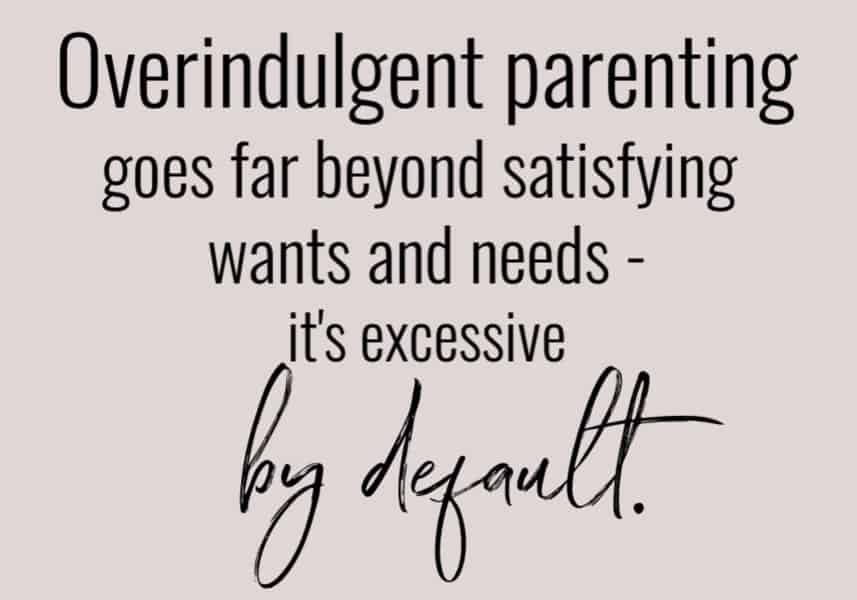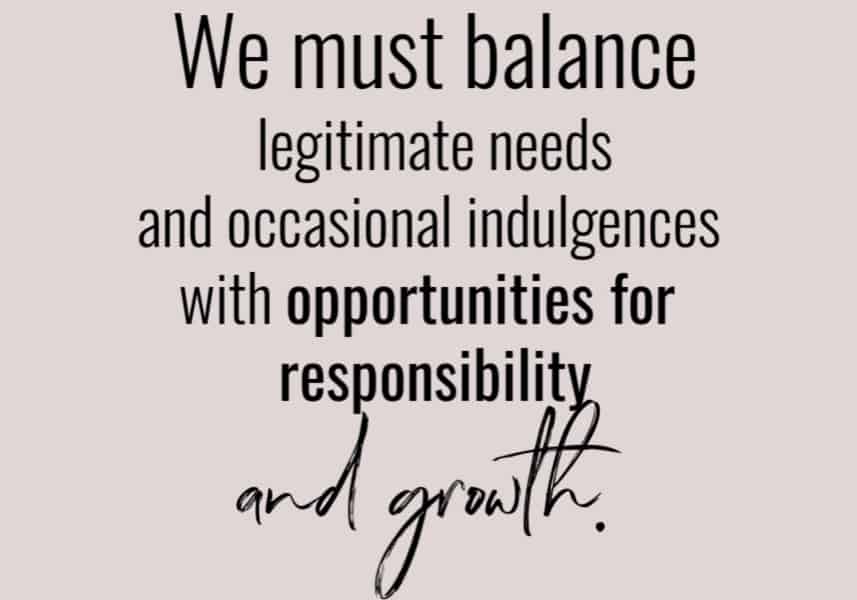
Boundaries. They come in so many forms in the parenting game. Overindulgent parenting is one of many traps we can fall into when the boundaries with our kids aren’t clearly defined.
We know we have to set limits on our child’s behavior, the foods they eat, the entertainment they consume, and so much more.
I’ve written previously about teaching the virtue of patience. But what happens when we fail to enforce healthy boundaries by not just delaying gratification– but giving our children too much?
Whether it’s buying them too much, allowing the same bad behavior once again, or handing out that 7th drink of water at bedtime — how do we know when enough is good enough?
How do we know when we’re giving in instead of holding back – for their ultimate good?

This post likely contains affiliate links. Please see our disclosure for more info.
The Problem with Overindulgence
I think we’ve gotten used to a certain level of excess, at least in Middle Class America, to the extent that it’s become the norm.
Why only buy one pair of shoes when you can buy 2 and get the the second pair half-price? Why buy one cheeseburger when you can get two for just $2 more?
As I’m writing this it’s nearing the Christmas season – a time when we probably are most likely to consider the problem of overindulging our kids.
But the more-is-more consumerism mentality has evaded just about every aspect of our lives, including how we parent.

We tend to swing from one extreme to the other. I think this is why minimalism has become adopted by so many moms in recent years.
We know that excess doesn’t make us any happier. We know that having more “stuff” and unlimited choices doesn’t actually deliver the fulfillment it promises.
Yet, most of us still struggle with finding that good place between want and never-in-want.
Let’s take a look at the different ways we might overindulge our kids, even unknowingly, and how to change these habits for the good of our family.
How do we define overindulgent parenting?
You might think of indulgence as enjoying the occasional piece of chocolate, or sleeping in on a Saturday morning or enjoying a nice meal out once a month.
Indulgence goes beyond enjoyment in the routine things of life. It’s when we “treat” ourselves, but in moderation.
Overindulgent parenting, then, is when our pattern of what we give or allow our kids to do or have is indulgent by default. It goes above and beyond satisfying a need or want – it’s excessive to start with.

Now, of course, it can be hard to establish a baseline for what excessive really means.
Some parents simply have more resources or time to give than others.
So let’s first look at our intentions to answer the question, are you overindulging your kids?
WHY do we overindulge?
Some of the reasons for overindulgence are obvious, with guilt being at the top of the list.
Parents who are in a co-parenting situation, or parents who work a lot of hours may buy their kids excessive gifts or try to provide every want to make up for lost time or in an attempt to replace emotional needs.
Our culture defines success as financial gain; therefore we sometimes feel a need to prove our success through what we do for our kids.
Sometimes we want to give our kids more than we had as a child, to further prove our own success to ourselves.
In the digital parenting age, we also at least want to APPEAR that we’re the #bestparentever, so we might go to great lengths in attempt to fit into the mold of the status quo.
Here’s another example: Have you ever heard the expression “martyr-mama”?
It’s where you never do anything for yourself as a mom in order to overindulge every need/want of your kids.
And it’s also unhealthy.
Giving time and attention is a very legitimate need, but setting your kids up to never have to entertain themselves or pour their own drink? It’s a recipe for another type of entitlement that is just as damaging as material excess.

Being an intentional parent means that you not only set aside time and resources for your kids, but you consider the outcome of HOW those things are allocated, and when.
We have to find that balance of responsibility/growth (learning to do things for themselves in age-appropriate ways), and meeting legitimate needs in legitimate ways.
The pitfalls of excess
It can be hard to look forward and really see the damage excess creates. It’s such a temptation, but keeping these consequences in mind really can help to break the cycle over overindulgence.
1| Expectations
The most obvious problem is that when we give our kids too much, it becomes an expectation.
Not only do they expect you will provide above and beyond their needs, they won’t understand when other kids don’t have the same accommodations.
In turn, they may not be very kind to those kids who don’t share in their problem of over-abundance.
And what happens when other adults don’t cater to them in the same way we do? Yikes.
Should we feel guilty for having our kids in neat/clean clothing or for buying them a nice birthday gift or going that extra mile now and then?
No, and we shouldn’t assume bad intentions of other parents who do the same.
However, we need to consider again our personal intentions, values and goals for our kids.
If we want them to have compassion, integrity and generosity as character traits, setting a pattern of excess will make it much harder for these lessons to stick.

2| Disconnect from the real world
Another way we often allow excess is in how we let our kids spend their time at home.
It’s really no wonder that kids are addicted to electronics – our busy lifestyles make it hard to sit down and just relax with our kids.
We’re working from home or balancing a side hustle or a myriad of other tasks along with parenting.
At least in my experience, it can be hard to manage screen time when you simply have so many things to do during the day.
What happens, though, is that we forget kids don’t yet have the discipline to set down their devices. They don’t have the maturity to overcome tech addiction, either.
Please know that this isn’t an attempt to beat someone over the head for letting their kid have more than the recommended screen time guidelines. I struggle with this constantly myself.
What I’ve come to realize though, is that when I overindulge my kids’ request for screen time, I’m limiting their opportunities for other things– like real, in-person connections that they desperately need to have.
Related: Living Rural and Raising Small-Town Kids: 5 Things to Know

3| Upkeep and Time
Let’s not overlook the amount of STUFF we buy our kids. The more stuff you and your kids have, the more you have to keep up with/ manage / get rid of later.
That’s time you could be doing a lot of other things that you actually enjoy!
The more sports your child is involved in, the more juggling of your schedule is going to be required.
And at some point, if you’re not careful – and especially you have more than one child – your kids’ activities can lead to very stressed out parents and disconnected family time (if any).
Because you simply can’t all be in several places at once, and you can’t spend much time at home together around the dinner table (a research-backed priority) when you’re constantly shuffling kids to practice and games.
Some families thrive on this excitement – and I get that (I’m just not one of them!).
But I truly believe it’s important to consider everyone’s needs in the family, and not just cater to the child(ren) or the idea that they MUST be busy, outside the home, 24/7.
And what about sleep? If we really want to overindulge our kids – let’s give them excessive sleep!
Because I can tell you from experience that getting home at 8:30, having to finish homework, shower and get to bed at a decent time is simply impossible.
And then we wonder why our kids struggle with symptoms of anxiety and depression.
Honestly, the lost art of down-time and free play at home has an understated value that many of us don’t understand until we’re in the burnout zone.

And our kids are right there with us but often don’t know how to express it.
4| Debt
If your kids are in more activities than you can really afford or have nicer clothes/stuff than your budget really allows, you’ll soon find yourself in debt.
This is a huge reason in itself to avoid this trap.
Not only does trying to keep up with the Joneses cause money problems (which can quickly turn into marriage problems), it teaches our kids that our value is based on what we have, and not who we are.
Living within your means is not valued in most circles today; yet it’s just as necessary as it’s ever been.
Anything can happen to shake your family’s financial security- things that you have NO control over (accidents, disability, job loss).
Parenting comes with lots of legitimate expenses, no doubt. So we should be that much more concerned with being good stewards of the finances we do have and how we budget those resources.
And keep in mind that the debt will hang around long after your kids are grown – and could keep you from enjoying time with your kids later on if you’re forced to work well into retirement.

Excess comes at a high cost in more ways than we usually realize in the moment.
How to know when enough is enough
Here are a few signs that it’s time to re-evaluate how much you’re giving your kids and why:
- Your children don’t seem to understand the concept of money and lash out when you won’t buy them a “want”
- You notice that you purchase things for your kids out of guilt
- Your kids seem self-centered and entitled
- You simply can’t afford most of the things you buy for them or are in debt due to excess
- Your kids act helpless at home and seem irresponsible for their age
- You’re constantly stressed out by too many activities
- You feel that your family is disconnected from each other
Any of these could be symptoms that it’s time to make some changes in what you do for your kids.
What to do when you’re ready to kick the habit
Back to those boundaries again. If you don’t have them, you need them.
We need to enforce boundaries on our kids’ behavior, or they’ll be out of control.
We need to set boundaries on what we spend on our kids, or our debt will be out of control and we’ll pass those bad habits onto them. (We also set them up for unrealistic expectations and entitlement.)
We need to enforce boundaries between our responsibilities and theirs at home, if we want to raise responsible kids.
Once we realize we’ve failed to do any these things, the good news is, we can make changes.

It’s going to be hard at first. Expect your kids to push back in major ways!
Just know that there is safety and actual freedom within reasonable boundaries, and kids not only need them but actually want them (but don’t know it).
And the boundaries we’re setting, overall, will have a significant, positive impact on the rest of their lives.
You’re unraveling some bad habits and it will take some time for them to adjust – but eventually, they will and so will you.
Avoiding overindulgence as an act of love
Keep in mind: you’re not depriving your kids of anything by setting limits on your spending and on what you allow them to do/ have/ be responsible for.
Instead, you’re giving them the opportunity to develop an appreciation for hard work, the value of a dollar and the feeling of accomplishment of doing things for themselves.
Sometimes the best way we can show our kids we love them is to withhold some things from them.
When you decide to say “no” to overindulgence and excess, you’re not only building critical skills and character traits – you’re setting them up for the real world where moderation yields much happier adults.
The thing is…excess is everywhere in our culture. We’ve learned it and they’ve learned it (and they are much more influenced by their peers than we are).
Let’s remember that we can also un-learn it, and find freedom from the trap of overindulgence- for ourselves and our kids.
And when we do, our lives will be better because of it.
You might also like:
A Christian Parent’s Guide to Handling Back Talk
The Keys to Raising Kids Who are Responsible (and not entitled)
The Critical Importance of Boundaries (and why we struggle with them so much)
Teaching Kids to Listen the First Time- Without Yelling
Originally published June 22, 2019 and last updated January 28, 2024.
